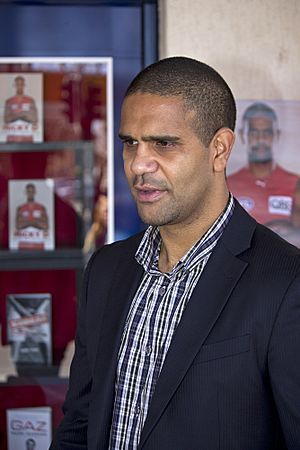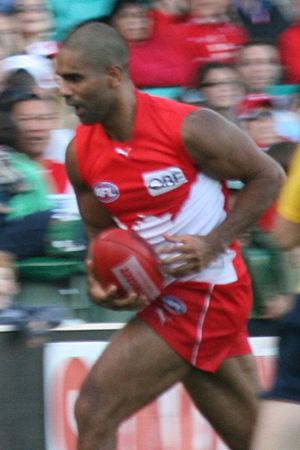Michael O'Loughlin facts for kids
Quick facts for kids Michael O'Loughlin |
|||
|---|---|---|---|

O'Loughlin at an autographing session in September 2012
|
|||
| Personal information | |||
| Full name | Michael Kevin O'Loughlin | ||
| Nickname(s) | Micky O, Magic Mick, Paradise | ||
| Date of birth | 20 February 1977 | ||
| Place of birth | Adelaide, South Australia | ||
| Original team | Central District (SANFL) | ||
| Draft | 40th overall, 1994 Sydney |
||
| Position(s) | Forward | ||
| Career highlights | |||
|
Club
Representative
|
|||
Michael Kevin O'Loughlin (born 20 February 1977) is a famous former professional Australian rules football player. He played his entire career in the Australian Football League (AFL) with the Sydney Swans team.
Michael O'Loughlin is a respected member of the Indigenous Team of the Century. He was one of the first players with Indigenous heritage to play 300 AFL games. He was chosen twice for the All-Australian team. He also played for Australia in the International Rules Series and won the Fos Williams Medal. This award is given to the best player for South Australia in State of Origin games. Michael was the first Sydney Swans player to play over 300 games. In his 303 games, he scored 521 goals.
Contents
Early Life and Family History
Michael Kevin O'Loughlin was born on 20 February 1977. His parents were not married, so he took his mother's family name, O'Loughlin. This name came from her Irish great-great-great-grandfather. When he was growing up, Michael supported the Carlton Blues football team.
Michael's family background is very diverse. He has ancestors who were Czech Jews, Aboriginal Australian (from the Kaurna and Ngarrindjeri groups), Irish, and English. He is a direct descendant of Kudnarto (born around 1832, died 1855). Kudnarto was a Kaurna woman who made history in 1848. She was the first Aboriginal woman to marry a British settler in the colony of South Australia.
Michael grew up in Adelaide, South Australia. He started playing junior football with the Central District Football Club in the SANFL league.
Michael's AFL Career
Michael O'Loughlin was chosen in the third round of the 1994 National Draft. He played 12 senior games for the Sydney Swans in 1995. That year, he was nominated for the AFL Rising Star award. The next year, he was a key player when the Swans won the minor premiership. However, they lost to North Melbourne in the grand final.
Michael held the record for the most games played for the Swans for a while. He passed John Rantall's VFL/AFL record in 2007. Later, his cousin Adam Goodes played even more games and broke Michael's record. In 2009, Michael became the first Sydney Swans player to reach the amazing milestone of 300 career games.
Michael often played as a half-forward flanker early in his career. He was very fast, strong, and agile, which made him hard for other teams to stop. People called him "Magic" because he played so skillfully. He was also known as "Micky O". Later in his career, he mainly played as Sydney's full-forward. He was the club's top goalkicker in 2000 and 2001.
In 1998, Michael was named the club's best and fairest player. He was also runner-up for this award in 2000. He was selected for the All Australian Team in 1997 and 2000. When State of Origin games were still played, he represented his state, South Australia. In 1998, he received the Fos Williams Medal as the best South Australian player.
In 2005, Michael O'Loughlin was chosen for the Indigenous Team of the Century. His cousin and Sydney Swans teammate, Adam Goodes, was also selected. Michael was picked for the full-forward position. He said this honor, along with winning the 2005 premiership, was the best part of his career.
Michael was the only player left in the team from the 1996 grand final loss. He played very well in the 2005 Grand Final, taking some amazing marks. However, his kicking for goal was not as accurate as usual that day.
In 2006, Michael continued to be a vital part of the Swans team. He played a big role in the qualifying and preliminary finals. These wins helped the Swans reach the grand final for the second year in a row. In a close qualifying final against the West Coast Eagles, Michael scored a goal and celebrated with passion. This moment is shown in Jamie Cooper's painting the Game That Made Australia. This painting was made in 2008 to celebrate 150 years of Australian rules football.
In the 2006 Grand Final, Michael played well and kicked three goals. He continued to play consistently for Sydney throughout the rest of his career. On 23 June 2009, Michael announced he would retire at the end of the 2009 season. He played his 300th game in round 19 against the Richmond Tigers.
Awards and Achievements
Michael O'Loughlin received many awards and recognitions during and after his career:
- AFL Rising Star nominee in 1995
- All-Australian team member in 1997 and 2000
- Played in the International Rules Series in 1997 and 2000
- Won the Fos Williams Medal in 1998
- Won the Bob Skilton Medal in 1998, which is the Best and Fairest award for Sydney (AFL)
- Was runner-up for Best and Fairest for Sydney (AFL) in 2000
- Was the Sydney Swans' leading goalkicker in 2000 and 2001
- Was a Sydney Swans Premiership player in 2005
- Is a member of the Sydney Swans Hall of Fame
- Received the Outstanding Achievement in AFL award from The Deadlys in 2005 and 2009
- Is a member of the Indigenous Team of the Century
- Was named Male Sportsperson of the Year by The Deadlys in 2009
- Won the AFLPA Madden Medallist award
- Was inducted into the Australian Football Hall of Fame in 2015
- Was inducted into the SA Football Hall of Fame in 2017
After His AFL Career
After retiring from playing, Michael O'Loughlin continued to contribute to Australian rules football. In 2009, he received the AFL Players' Association Madden Medal. This award recognizes players for their contributions both on and off the field.
In 2010, Michael coached the Flying Boomerangs Indigenous team during their tour to Cape Town. He led the team to victory against the South Africa National Australian Rules Football Team. He was later named coach of the World 18 team for the AFL National Under 16 Championships.
In 2011, he was chosen as the coach for the Indigenous All-Stars team. They played against the Richmond Tigers. Michael also played for South Australia in a charity match called the West End Slowdown. This game featured retired players and raised money for the Little Heroes Foundation and the Reach Foundation.
The GO Foundation
In September 2009, Michael O'Loughlin started the Goodes O'Loughlin Foundation, also known as the GO Foundation. He co-founded it with his cousin Adam Goodes and their friend James Gallichan. The foundation began in Dareton, New South Wales, helping local Aboriginal communities.
In 2014, the GO Foundation began to focus mainly on education for Indigenous Australians. It set up a board of directors and partnered with organizations like the Sydney Swans, Allens Linklaters, QBE Insurance, and KPMG Australia. The foundation started by offering a few scholarships to independent schools. By 2021, the GO Foundation had grown significantly. It now supports students in 26 schools, mostly public schools, and five universities.
 | Calvin Brent |
 | Walter T. Bailey |
 | Martha Cassell Thompson |
 | Alberta Jeannette Cassell |


